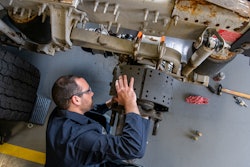
Wrenches turning means shops (and techs) earning, but with more technology in trucks — and in diagnostics and repair — there are more opportunities for distraction.
Phones are the No. 1 technician distraction shop owners tell Trucks, Parts, Service, but there are other things too, including watercooler talk and any variations thereof, overly friendly customers, and, sometimes, just life itself.
“I believe [technicians] are more distracted,” says Nick Richardson, trailer service manager at Blaine Brothers. He says there’s more opportunity for technicians to be distracted with phones, tablets and other things at their fingertips. Plus, there are social gatherings and making connections as a team.
“We encourage conversations, but also staying on task and keeping efficiency in mind,” he says.
Efficiency, productivity and technicians
Fullbay, maker of heavy-duty repair shop software, says efficiency and productivity are different but related. Efficiency is the number of hours a tech works compared to the number of hours a shop bills for. Productivity refers to how many jobs a tech completes per day.
Shop owners, the company says in a white paper, may be tempted to make their shop more productive in the hopes efficiency will soon follow. However, Fullbay says a more efficient shop is a more productive one. Creating a culture of efficiency across the whole operation will keep those wrenches turning and improve the bottom line.
[RELATED: Fullbay, TMC survey show repair shop workforce on the rise, despite challenges]
Some frequent issues Fullbay sees trying to create an efficient operation are random job assignments that mismatch jobs and tech expertise, delays in job assignments, incomplete or inadequate repair orders, parts availability and a lack of training.
All of those things come back to what’s going on at the top.
Leadership: A culture of efficiency
It’s up to shop leadership to create a culture of efficiency.
As a manager at Blaine Brothers, Richardson says he sets clear expectations of each job or task techs are assigned to do, realizing some techs are more efficient than others. He tries to show and receive the mutual respect of not having to micromanage every tech in his shop.
“They’re all human and they all have their bad days,” he says, adding his techs have personal freedoms so long as they’re meeting expectations to the best of their abilities.
Tim Grabow, president of the company, agrees.
“Really, it’s just managing the expectations of when they shouldn’t be on their phone,” he says.
Blaine Brothers leaves it up to the service writers to keep an eye on efficiency. Jason Kendrick, director of service, says the service writers know based on their data when someone is struggling to make their times. It’s up to them to keep their technicians efficient.
Another large service business with multiple locations told TPS much the same: Distraction is a byproduct of too little mentorship or none at all. “With the lack of leadership and true mentorship, technicians can and do get distracted with social media,” an executive says. “That dynamic is not exclusive to technicians.”
Phones a particular problem
Phones are problematic for all techs but are especially distracting for young workers, shop owners tell TPS.
According to a Reviews.org study, the average American checked their phone 205 times per day. That’s nearly once every five minutes they’re awake. Nearly half of Americans (43%) say they feel they’re addicted to their phones.
“[The phone] is a necessary evil,” Grabow says. His techs use their phones to look up parts, following a troubleshooting trees, take pictures on mobile service calls, do safety training and more.
The problem seems to be generational, managers told TPS.
“The younger guys were born with phones and tablets in their hands,” Richardson says. Younger people seem to more quickly adopt technology, the large service provider executive says, adding his organization has policies in place to govern phone usage on the job. That includes using personal devices at work for their own convenience, but not while driving, as in the event of a mobile service call.
[RELATED: Building a tool set for starter technicians]
Kendrick says comeback calls related to phone usage aren’t “a huge problem,” though they have handled incidents of social media usage while driving that ended negatively.
Other distractions
Grabow says next to phones, a big distraction for his staff is something on everyone’s mind — sales are down and the trucking industry is slowing down.
“The economy stuff really does weight heavy on all our minds,” Grabow says. He says he and his team go out of their way to keep everyone well-informed. “If I had any recommendation for anybody: Share information with your team.”
Will Roth, the tank shop supervisor at Blaine Brothers, says in smaller shops, customers often stop to chat with technicians. It’s great for building relationships, he says, but not great for productivity or efficiency. It takes a team effort to keep those customers off the shop floor.
“The most effective means to prevent technician distraction is engaged leadership,” the service provider executive says. “Technology and company policy cannot substitute engagement. Company culture certainly has more influence than company policy.”









